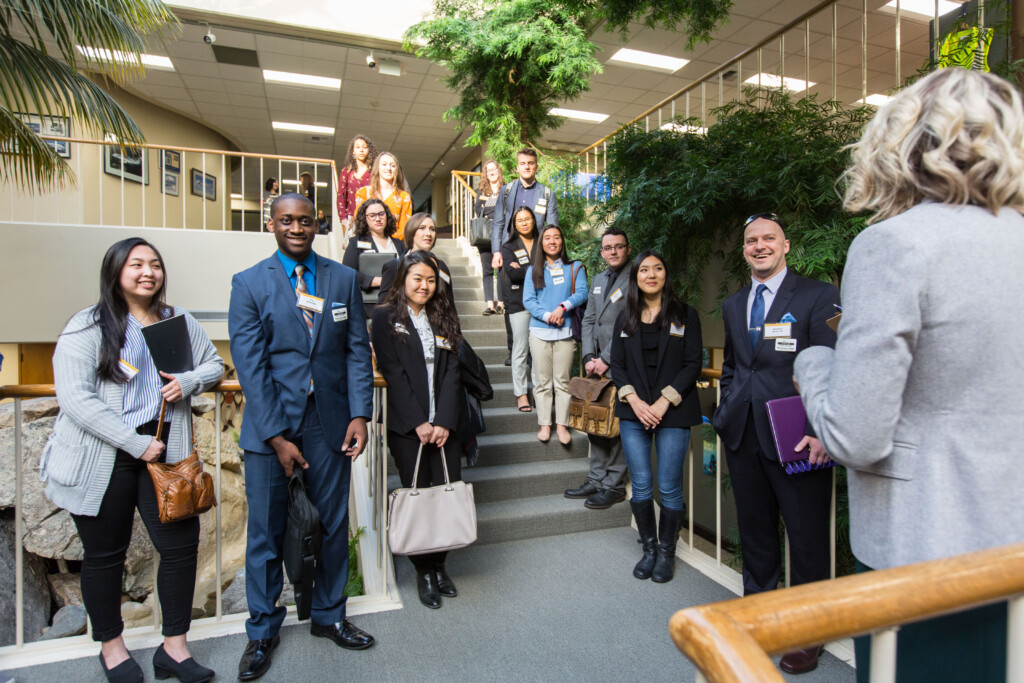Page 36 • (450 results in 0.05 seconds)
-
faculty mentors.What can I do When I Graduate?Although few occupations include “sociologist” in their title at the bachelor’s level, the sociological perspective is excellent preparation for a wide variety of occupations in social and public services, management, education, government, and business. Students who graduate with a B.A. in sociology and enter the job market directly will find themselves competing with other liberal arts students, but with an advantage – knowledge of key social factors and
-

academic and professional journey. Through individual career counseling appointments, our advisors can help you with things like: Job and Internship Searches Professional Resume and Cover Letter Writing Interview Preparation Career Exploration “The career and internship advisor I met with was SO helpful! I was stressed out that I would not be able to reduce my resume down to one page, but her tips made it possible. She also showed me ways to look up internships on LinkedIn.” Emily S. ’22, Business
-
PLU Course Numbers by Level 100-299 Lower-Division Courses: Open to first-year students and sophomores unless otherwise restricted. 300-499 Upper-Division Courses: Generally open to juniors and seniors unless otherwise specified. Also open to graduate students, and may be considered part of a graduate program provided the courses are not specific requirements in preparation for graduate study. 500-699 Graduate Courses: Normally open to graduate students only. If, during the last semester of the
-

said. “But right now, they’re doing so in facilities that don’t match the quality of the program.” The new center will be located just steps from the main campus, in a building previously occupied by the Garfield Book Company. Preliminary design, engineering and preparation work has been done, and fundraising to support the $6.5 million project is underway. McGranahan Architects is designing the center. The center will house a state-of-the-art training facility that will include expansive classroom
-
allowed in locations or situations other than those noted as allowed in the previous section. Such areas of campus where pets are not allowed include: Areas that are open to the public and commonly used, such as libraries, foyers, bathrooms, copy rooms, lounges, meeting and conference rooms, except as necessary to travel en- route to permitted locations. Classrooms and training labs (except for instructional purposes as noted above). Dining and food preparation areas; kitchenettes; break-rooms
-

percentage of today’s students will spend the majority of their careers doing jobs that currently don’t exist. We also know that a mere 27 percent of bachelor degree holders serve in positions related to the field they studied and that 26 percent of college graduates change careers within five years of graduating. For those to whom job preparation is paramount, there should be no greater realization than the importance of illustrating the value of widely transferable knowledge and interdisciplinary
-
REQUIREMENTSHOW TO APPLYFAST TRACKTRANSFER CREDITSAdmission Requirements Admission to the MSW program is based on a holistic review of your academic preparation, work and volunteer experiences, and potential contributions to the classroom experience, the social work profession, and social justice. Admission into the MSW program is determined by faculty evaluation by the MSW Graduate Admissions Committee. Review of MSW applications is based on the following requirements: Advanced Standing (one
-
make or change my volunteer schedule? Contact the PLC staff using the literacy@plu.edu email address or speak directly with one of the Directors or Assistant Directors. Staff Assistant Director Lydia Downs lydia.downs@plu.edu Lydia is in her second year at PLU, majoring in elementary education and minoring in Peace Corps Preparation. Lydia is from Portland, OR. Education is something Lydia is very passionate about. She has been a camp counselor, teaches swim lessons, and coaches swim team every
-
Christ’s descent into hell helps us imagine how Christian communities can be spacious enough to acknowledge and hold those who are undone by illness,” Thompson says. “Only then does it become possible to identify the hope that can emerge from our not-yet-resurrection reality to imagine more in life today as well as in the life to come.” We invite you to read Dr. Thompson’s book Glimpsing Resurrection: Cancer, Trauma and Ministry with us in preparation for the conference events and join us for a virtual
-
substance use disorder Level I or Level II treatment (directly or through agreement), and rehabilitative case management. Training sites have designated instructors for clinical supervision. Providing key program metrics and feedback regarding the level of student preparation. Federal Financial AidExternal Scholarship ResourcesMilitary Aid Programs
Do you have any feedback for us? If so, feel free to use our Feedback Form.


